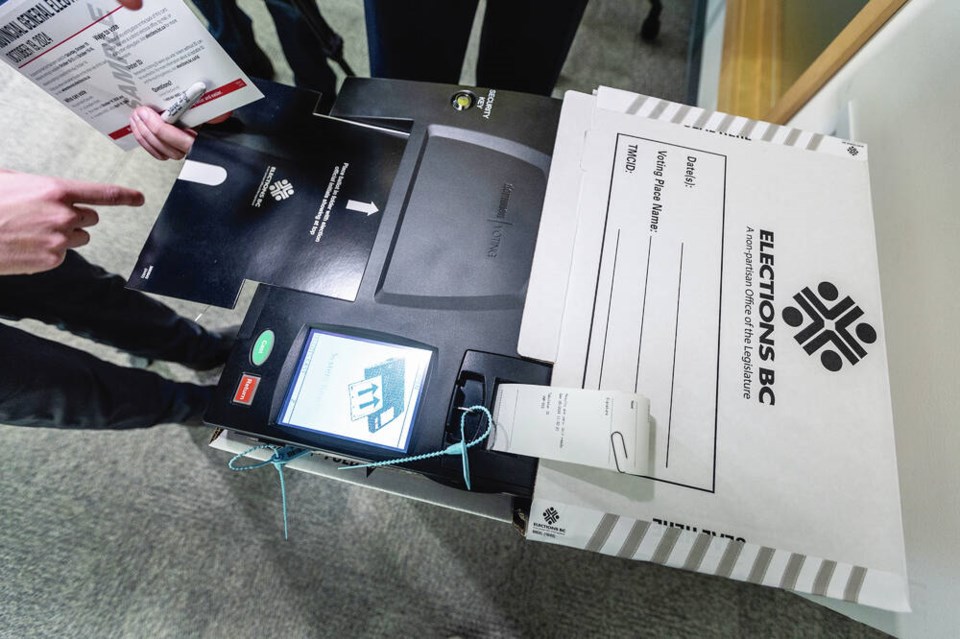With just over a week until the provincial election, the B.C. NDP is scheduled to be in court today trying to get the party name “BC Conservative Party” on future communications rather than just “Conservative Party,” to avoid voter confusion with the federal Conservatives.
With ballots already printed, the NDP is expected to modify its request in a new application, asking that Elections B.C. use “BC Conservative Party” on any future literature, publications and communications.
The B.C. NDP filed a petition in B.C. Supreme Court last week seeking a judicial review of Elections B.C.’s decision to allow on ballots the abbreviated version of the name, which has been used in two byelections since May 2023.
The B.C. NDP complained in August but chief electoral officer Anton Boegman concluded the name “Conservative Party” was not confusing.
Elections B.C. spokesman Andy Watson said in an email to the Times Colonist that under the Election Act, a party’s ballot name must not be likely to be confused with another provincial political party. It says nothing about confusion with federal parties.
Approximately 102,000 vote-by-mail packages have already been sent to voters.
Before candidate nominations close, mail-in ballots are “write-in” ballots where you can write a party, leader or candidate’s name. After the nominations close, vote-by-mail packages include regular ballots where voters can mark an X or fill in a circle beside candidate names.
The B.C. NDP argued in its petition that the Conservative Party of British Columbia’s omission of “BC” on the ballot is intended to mislead voters into thinking they are voting for Pierre Poilievre’s federal Conservative Party, which is “currently enjoying popular support.”
The party says through voter outreach, it discovered some voters in the Oct. 19 provincial election believe they are going to vote for Poilievre to replace Prime Minister Justin Trudeau.
“The intention and effect of this change to the CPBC’s ballot name is to confuse voters,” says the petition. “The CPBC appears to hope that voters will vote for it in the upcoming election, thinking they are voting for the federal CPC.”
The party argues that permitting the Conservative Party of British Columbia to use a ballot name that could mislead voters “infringes on voters’ rights” under the Charter of Rights and Freedoms related to meaningful and informed participation in elections.
According to Elections B.C., if voters who receive write-in ballots opt to write “Poilievre” or “Conservative Party of Canada,” those ballots would be spoiled.
Royal Roads professor David Black said it’s no surprise that “low-information” voters may confuse provincial with federal parties, saying politics can sometimes be as complicated as astrophysics. “Not everybody knows how to look at a constellation in the sky and say ‘that’s Orion,’ ” said Black, who emphasized that the term “low-information voter” is a political one and not a criticism.
“With politics, even though our lives are affected by them materially, it’s just not something that people are always prepared to follow.”
He said the NDP have a point that there will be “honest confusion among voters” about the Conservative Party.
Black said while the provincial and federal Conservative parties are not affiliated, the “Cinderella rise” of the Conservative Party of British Columbia has a great deal to do with the popularity of the federal party’s “common sense” momentum, as well as behind-the-scenes help from the federal party “at all levels” — from identifying Conservative supporters to providing software, and staffing and strategic advice.
Faced with making “high stakes” decisions from a “low-information position,” many voters resort to deciding who’ll get their vote based on political advertising and simplified messaging on policy, he said.
One recent example of name confusion is that of the B.C. Liberals, who were in government from 2001 to 2017. That party was more right-wing than the centrist federal Liberal Party.
To avoid confusion with the federal party, the provincial Liberals re-branded in April last year to BC United, but a Léger poll in October 2023 found one third of voters didn’t know about the name change. The party asked Elections B.C. to add “(formerly BC Liberal Party)” to its ballot name, before the BC United party leader pulled the plug on its campaign altogether.
“So there is a lot of nuance, and I don’t blame people at all for being low-information voters,” said Black. “When it comes to fixing a car, I’m a low-information car-repair person.”
>>> To comment on this article, write a letter to the editor: [email protected]



